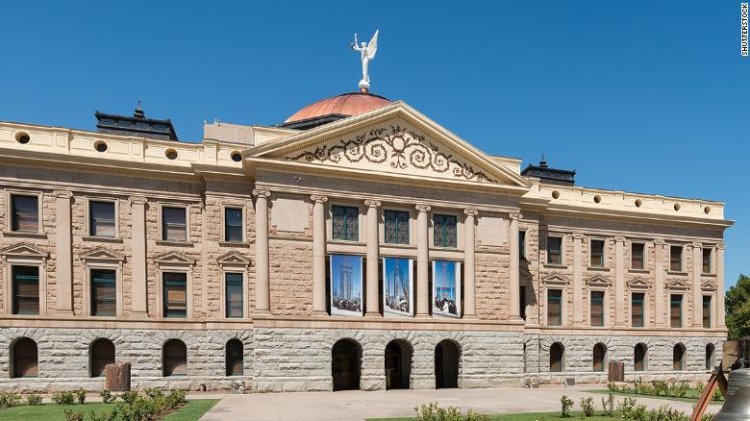Arizona lawmakers adopt a bill prohibiting transgender minors from receiving gender-affirming treatment.
Legislators will also send Ducey a bill called the "Save Women's Sports Act," which restricts transgender athletes from competing on women's and girls' teams at all public schools and some private institutions, following a pattern in other GOP-led states.

On Thursday, Arizona lawmakers passed two laws aimed at transgender adolescents in the state, one of which would limit access to gender-affirming health care. The bills will now be presented to Republican Governor Doug Ducey for his signature.
On Thursday, the state's Republican-led House passed the health-care restriction by a vote of 31 to 26. In February, the bill cleared the state's Republican-controlled Senate by a vote of 16-12.
SB 1138 states that "a physician may not administer irreversible gender reassignment surgery to any individual under the age of eighteen."
There are several exceptions to the bill, such as in the instance of someone who was born intersex.
Arizona would be the latest state to implement such a prohibition if the governor signs the law.
Last year, Republican lawmakers in Arkansas overrode a veto from their governor to put their care ban on the books, and Tennessee has passed a similar ban.
Legislators will also send Ducey a bill called the "Save Women's Sports Act," which restricts transgender athletes from competing on women's and girls' teams at all public schools and some private institutions, following a pattern in other GOP-led states.
Ducey's spokesperson refused CNN's request for comment.
The rules are part of a bigger effort by conservative lawmakers to restrict transgender youth's life in the United States.
The prohibitions have been widely opposed by LGBTQ groups, who argue that they further marginalize a vulnerable community and risk causing real harm to a minority that has one of the highest suicide rates in the country.
"We are organizing to ask @DougDucey to veto it," said Chase Strangio, an attorney with the American Civil Liberties Union, on Twitter. Last year, the group sued Arkansas to overturn the ban, and a federal court temporarily blocked it from taking effect in July.
"Children who are transgender do not deserve to be the victims of degrading attacks that invalidate their identities. This law could have catastrophic, life-threatening effects for transgender young people who require medical treatment "In a statement, Bridget Sharpe, Arizona state director of the Human Rights Campaign, one of the country's leading LGBTQ rights organizations, warned.
Some medical organizations, such as the American Psychiatric Association, have spoken out against bills like SB 1138, stating last year that "patients and their physicians, not lawmakers," should make judgments about what care is best for them.
The governor is also looking into the sports ban.
The sports ban, which was also given final approval by Arizona lawmakers on Thursday, is similar to others adopted across the country in recent years.
It covers teams "supported by a public school or a private school whose students or teams compete against students or teams from a public school."
The bill states that "athletic teams or sports designated for 'females,' 'women,' or 'girls' may not be offered to male pupils."
Though the measure mentions "biological sex," it doesn't define what that means. Similar bills in other states have stipulated that "biological sex" is defined as the sex marked on a student's original birth certificate.
While sex is a wide term that encompasses physiology, a person's gender is an inborn sense of self. Anatomy, genetics, and hormones are some of the components that go into establishing the sex indicated on a birth certificate, and each of these categories has a lot of natural variances.
As a result, opponents have claimed that the usage of the term "biological sex" in this statute is unnecessarily simplified and misleading.
Earlier this month, Republican state Sen. Nancy Barto said, "SB 1165 protects opportunities for women and girls in athletics by maintaining a level playing field."
Advocates for such legislation say that transgender women and girls have physical advantages in sports over cisgender women and girls.
However, a 2017 report in the journal Sports Medicine that reviewed several related studies found "no direct or consistent research" that suggests transgender people have an athletic advantage over their cisgender peers, and critics argue that this legislation exacerbates discrimination against trans people, particularly trans youth.
Similar prohibitions have been enacted by Republican governors in Iowa and South Dakota so far this year. Last year, similar sports prohibitions were imposed in Alabama, Arkansas, Florida, Mississippi, Montana, Tennessee, Texas, and West Virginia, aggravating LGBTQ groups who believe that politicians are attempting to address an issue that does not exist.
Republican governors in Indiana and Utah vetoed bans enacted by Republican legislators earlier this week.

 Boakyewaa Lawrencia
Boakyewaa Lawrencia 



































